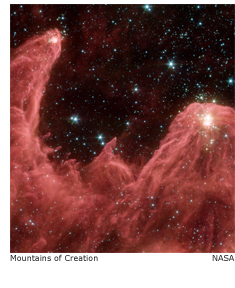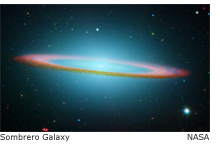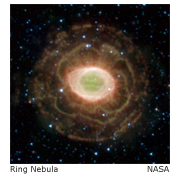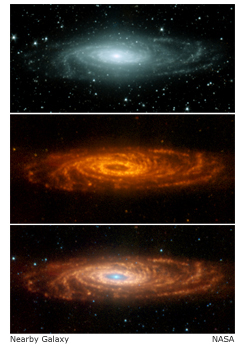
|
Syllabus Syllabus for printing - pdf AST 301 - INTRODUCTION TO ASTRONOMY COURSE WEBSITE: https://www.as.utexas.edu/astronomy/education/spring06/dinerstein/301.html Section: Unique No. 48100, Spring 2006 Class Meetings: Tu & Th 11:00 - 12:15 AM, Welch 3.502 Instructor: Professor Harriet Dinerstein, (512) 471-3449 Office: RLM 16.324, SE corner of Dean Keeton & Speedway E-mail: harriet@astro.as.utexas.edu Office Hours: M 1:30-2:30, W 10:30-11:30, or by appt TEACHING ASSISTANTS, OFFICE HOURS, AND HELP SESSIONS: Help Sessions: MW 5-6 PM, RLM 15.216B Teaching Assistant: Rongfeng Chen Teaching Assistant: Daungruthai Jarukanont ("Kanon"), RLM 7.212 Email: yuna@astro.as.utexas.edu Office Hours: T 2:30-3:30 PM COURSE DESCRIPTION: Welcome to Astronomy 301! This course will provide a one-semester introduction to the universe around us, from our own Solar System to stars, galaxies, and the largest scales of space and time. Since our goal is to paint the "big picture," it will be a bit of a whirlwind tour, but - as you will see - there are many connections from small to large scales. We will also discuss how astronomers determine such seemingly impossible-to-know things as distances to stars, masses of planets orbiting other stars, and what the universe was like, long ago.  TEACHING PHILOSOPHY: Since you are not science/engineering majors (if you are, you should take Ast 307!),
our main emphasis will be on conceptual understanding. However, just to express the vastness of space or smallness
of subatomic particles quantitatively, it is necessary to use "scientific notation" (powers of ten). In addition, in order to
understand how properties of astronomical objects are related to each other, we need to use ratios and proportionality.
There will be simple mathematical calculations on homeworks, but we will provide help if needed (see "Getting Help").
TEACHING PHILOSOPHY: Since you are not science/engineering majors (if you are, you should take Ast 307!),
our main emphasis will be on conceptual understanding. However, just to express the vastness of space or smallness
of subatomic particles quantitatively, it is necessary to use "scientific notation" (powers of ten). In addition, in order to
understand how properties of astronomical objects are related to each other, we need to use ratios and proportionality.
There will be simple mathematical calculations on homeworks, but we will provide help if needed (see "Getting Help").
TEXTBOOK: I have chosen the latest (Fourth) edition of "The Cosmic Perspective," by Bennett, Donahue, Schneider, and Voit. You will have to buy a new copy, since this edition has literally just come out (in the last few weeks). While there are several older and alternate textbooks by Bennett and his team, I do not recommend using them, for several reasons. The alternate versions omit some material you will need this semester (e.g. some of the alternate editions do not include the Solar System section, or stars and galaxies), or are organized differently so that the chapter and problem numbers do not correspond. Many illustrations and animations used in class will be from this edition, and I will sometimes assign homework problems from the directly from the book. In addition, the book comes with an access code that is required to access a variety of useful (and fun!) tools at the publisher's website. These include tools such as interactive animations organized into self-paced tutorials, practice quizzes, and other helpful supplementary materials. IMPORTANT DATES FOR THE SPRING 2006 SEMESTER:
INSTRUCTOR POLICIES AND EXPECTATIONS: If you do not engage actively with the course material and activities, you will fail to get the full benefit of enrolling in this class. To get your money's worth, it is important to attend class regularly, prepare for class as announced in advance (e.g. by reading the assigned textbook chapters), turn in assignments that are legible and on time, and treat your instructor and fellow with respect. It makes life more pleasant for everyone if you come to class on time (late arrivals create noise and distraction), turn off the audio ring on your cell phone, and do not read, rustle newspapers, or talk to other students during the class (unless asked to do so for a class activity). I also expect that you will not use laptops for activities - email, chat groups, browsing, etc. - unrelated to what is occurring in the classroom at that moment; this is distracting to fellow students and the instructor.  OBTAINING INFORMATION: The primary sources for information and updates about
class activities, homework due dates, dates of and material to be covered on quizzes and
exams, etc., are (1) announcements made in class, and (2) the class website (see top of page 1).
It is your responsibility to stay informed about these events from these sources or by asking
an individual classmate. In a class of this size, it is not feasible for the instructor or TA to provide a
detailed reprise of a missed class to each student who misses a particular class session, nor
should you post such a request to the entire class via Blackboard. I will not be using Blackboard;
instead, I will use our own class website for announcements and links to readings, Study Guides,
answers to quizzes, responses to student feedback, etc. Other materials are available at
http://www.masteringastronomy.com
(the publisher's website). An access
code that you can use to register for this site is packaged with each copy of the textbook.
OBTAINING INFORMATION: The primary sources for information and updates about
class activities, homework due dates, dates of and material to be covered on quizzes and
exams, etc., are (1) announcements made in class, and (2) the class website (see top of page 1).
It is your responsibility to stay informed about these events from these sources or by asking
an individual classmate. In a class of this size, it is not feasible for the instructor or TA to provide a
detailed reprise of a missed class to each student who misses a particular class session, nor
should you post such a request to the entire class via Blackboard. I will not be using Blackboard;
instead, I will use our own class website for announcements and links to readings, Study Guides,
answers to quizzes, responses to student feedback, etc. Other materials are available at
http://www.masteringastronomy.com
(the publisher's website). An access
code that you can use to register for this site is packaged with each copy of the textbook.
GETTING HELP: Once the class enrollment and Teaching Assistant (T.A.) assignments are finalized, we will schedule weekly office hours for the T.A.s as well as the instructor. There will also be T.A.-led help sessions, scheduled at a rate of about one or two per week depending on when homework is due and the dates of quizzes or exams. The help sessions will generally be in the late afternoons or early evenings, in Robert Lee Moore Hall. It is also possible to contact the instructor or a T.A. by email. We hope that many of your questions will be answered through postings on the class website, which will include responses to in-class activities, quiz answer files, or the FAQ ("frequently asked questions") page. Please call on us for help; that's what we're here for! TENTATIVE SCHEDULE OF TOPICS AND READINGS: (subject to revision)
 COURSEWORK AND GRADING: Course grades are based on a point system. There are no
quotas for "A's" or "B's." Grades will be based solely on your own performance. Detailed records will
be kept, updated, and accessible online at on eGradebook. The semester grade will be determined
on the following basis:
COURSEWORK AND GRADING: Course grades are based on a point system. There are no
quotas for "A's" or "B's." Grades will be based solely on your own performance. Detailed records will
be kept, updated, and accessible online at on eGradebook. The semester grade will be determined
on the following basis:
Hour exams - (60%). Multiple choice format (machine-graded). Three hour exams, counting 20% each.
***Important Note: I do not give make-ups for missed exams, even for valid reasons such as documented illness or personal emergencies. Instead, a student who misses an exam - or would like an extra chance to improve her or his semester grade - must take the comprehensive final exam (see below) for the other 20% of the grade. The final can also replace a previous low exam score. Short quizzes - (20%). About 5 or 6 essay-format short quizzes (partial class period). The best 4 quiz scores will be counted, with each counting for 5%. There are no make-ups for missed quizzes, since at least one quiz is dropped. Homework & Participation - (20%). Earned in and outside class, in various ways:
Optional Final Exam - Can be taken to replace a (one) low exam score, or one exam missed for any reason (no excuse or documentation needed). This will be a comprehensive exam (covers the entire semester), in multiple-choice format, which must be taken at the official time, Sat. May 13, 9 AM - noon.  SCHOLASTIC INTEGRITY: The University of Texas has recently adopted a new honor code relating to
academic integrity and scholastic dishonesty. You are responsible for knowing and following these
standards. For example, cheating during exams will not be tolerated, nor will plagiarism or copying on
homework or other written assignments. While you are allowed and even encouraged to discuss
concepts related to homework problems with your fellow students, TA's, and the instructor, the final
product must be your own work. In cases of exact duplications of homework or other assignments,
neither student will receive credit. For more information, visit:
SCHOLASTIC INTEGRITY: The University of Texas has recently adopted a new honor code relating to
academic integrity and scholastic dishonesty. You are responsible for knowing and following these
standards. For example, cheating during exams will not be tolerated, nor will plagiarism or copying on
homework or other written assignments. While you are allowed and even encouraged to discuss
concepts related to homework problems with your fellow students, TA's, and the instructor, the final
product must be your own work. In cases of exact duplications of homework or other assignments,
neither student will receive credit. For more information, visit:
http://deanofstudents.utexas.edu/sjs/ and click on the links to "The Standard of Academic Integrity" and "Scholastic Dishonesty." For example, see: http://deanofstudents.utexas.edu/sjs/scholdis_whatis.php STUDENTS WITH DISABILITIES: Upon request, the University of Texas at Austin provides appropriate academic adjustments for qualified students with disabilities. Contact the Office of the Dean of Students at 471-6259, or (TTY) 471-4641, or via email to ssd@uts.cc.utexas.edu or see http://deanofstudents.utexas.edu/ssd/. SPECIAL EVENTS: The Astronomy Department offers evening Star Parties (viewing through small telescopes) on campus. Early in the semester, Star Parties will be held on Friday and Saturday evenings, using the telescope on the roof of Painter Hall. (Later in the semester we hope to add some Wednesday evening star parties on the roof of RLM.) Star parties are held only when weather permits, and are cancelled when it's too cloudy to see stars; do not count on getting all of your Star Party credit in the last week of the semester, since late spring is a usually a pretty rainy season in Austin! Details of times and locations will be posted at http://outreach.as.utexas.edu/public/viewing.html. DEPARTMENTAL INFORMATION: If issues arise during the semester that cannot be resolved with the instructor or TA, you may contact the Chair of the Undergraduate Studies Committee, Prof. Gregory Shields (471-1402 or shields@astro.as.utexas.edu), or the Chairman of the Department of Astronomy, Prof. Don Winget (471-3302, chairman@astro.as.utexas.edu). More information can be found in a separate document, "Memo to Undergraduate Astronomy Students," handed out in class and also posted at http://outreach.as.utexas.edu/students/memo.html. |
13 January 2006
Astronomy Program · The University of Texas at Austin · Austin, Texas 78712
prospective student inquiries: studentinfo@astro.as.utexas.edu
site comments: www@www.as.utexas.edu
Astronomy Program · The University of Texas at Austin · Austin, Texas 78712
prospective student inquiries: studentinfo@astro.as.utexas.edu
site comments: www@www.as.utexas.edu